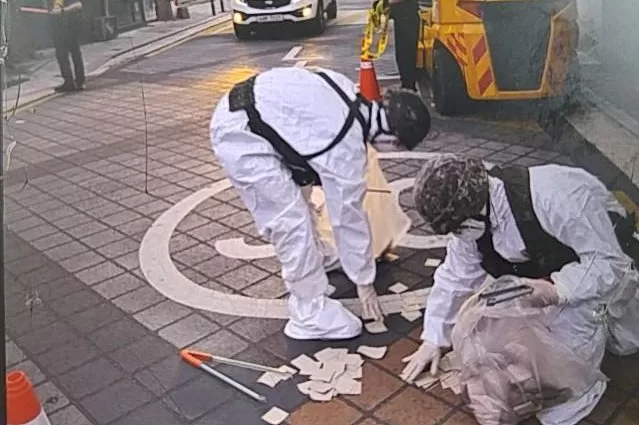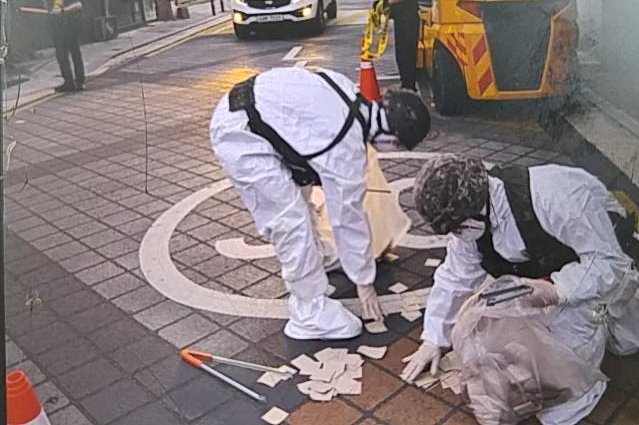1 of 3 | North Korea launched some 350 trash-filled balloons towards South Korea overnight, Seoul’s Joint Chiefs of Staff said Tuesday. The military recovered contents in areas including the Seongbuk District of Seoul. Photo courtesy of Republic of Korea Joint Chiefs of Staff
SEOUL, June 25 (UPI) — North Korea sent some 350 trash-filled balloons toward South Korea overnight, Seoul’s military said Tuesday, as back-and-forth provocations continue across a tense inter-Korean border.
As of Tuesday morning, around 100 balloons carrying trash and waste paper had landed in Seoul and the northern part of Gyeonggi Province, Seoul’s Joint Chiefs of Staff said in a text message to reporters.
An analysis of recovered balloons found they did not contain hazardous materials, the JCS said.
The latest launch marked the fifth time in the last month that North Korea has sent balloons filled with debris and even excrement, according to South Korean officials.
Seoul’s Unification Ministry told local media on Monday that parasites, such as roundworms and threadworms, believed to have originated in human excrement, were detected in earlier balloons.
South Korea briefly resumed anti-Pyongyang loudspeaker broadcasts at the border earlier this month in response to the launches. On Tuesday, the military said it was prepared to begin the transmissions again at any time.
“Our military’s psychological warfare broadcast against North Korea is ready to be implemented immediately and will be implemented flexibly depending on the strategic and operational situation,” the JCS message said. “This depends on North Korea’s actions.”
South Korean President Yoon Suk Yeol mentioned the North’s balloons during an address to commemorate the 74th anniversary of the Korean War in the southeastern city of Daegu on Tuesday, calling their launch “despicable and irresponsible.”
Yoon also slammed the defense treaty signed by North Korea and Russia last week during Russian President Vladimir Putin’s visit to Pyongyang.
“Last week, [North Korea] signed a ‘Comprehensive Strategic Partnership Treaty’ with Russia, which started the war in Ukraine, and promised to strengthen military and economic cooperation, in direct violation of U.N. Security Council resolutions,” Yoon said.
“It is an anachronism that runs counter to the progress of history,” he said.
The North’s launches appear to be a response to the longstanding practice of North Korean defectors floating balloons with anti-Pyongyang messages across the border.
Activist group Fighters for a Free North Korea said it sent 20 balloons carrying some 300,000 leaflets, USB drives containing South Korean media and U.S. dollars across the border last week.
On Friday, Kim Yo Jong, the powerful sister of North Korean leader Kim Jong Un, issued a statement in official media condemning the launch by “disgusting defectors” and warning of possible retaliation.
North Korea has reacted with fury to the activists’ balloons in the past. In June 2020, Pyongyang severed all communications with Seoul and blew up an inter-Korean liaison office over what it called South Korea’s failure to rein in the defectors.
The demilitarized zone that has separated the two Koreas since fighting halted in the 1950-53 war has also been the site of multiple border incursions in recent weeks, with North Korean troops crossing the military demarcation line three times since June 9.
On each occasion, the South Korean military fired warning shots and the North’s soldiers returned to their side of the border.
JCS officials said the crossings appear unintentional, as the North has been ramping up activity in frontline areas of the DMZ since withdrawing from an inter-Korean military agreement in November.
North Korean soldiers have been observed clearing land, laying mines, reinforcing tactical roads and installing structures that appear to be anti-tank barriers at several locations, the JCS said.

